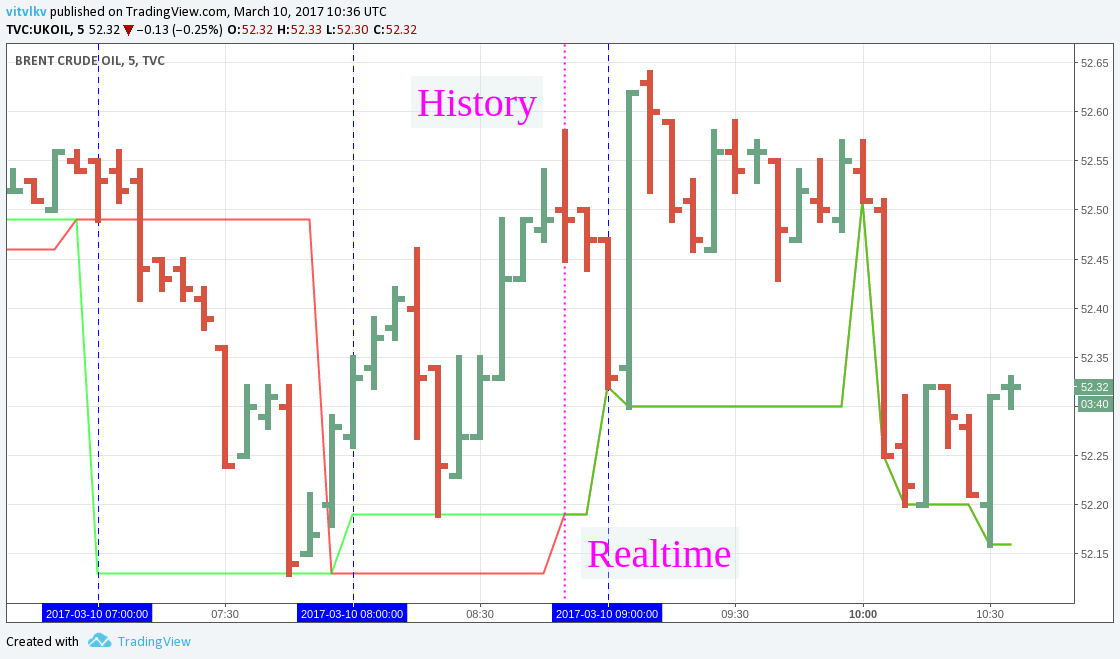Pine version 3 migration guide¶
This document helps to migrate Pine Script code from @version=2 to
@version=3.
Default behaviour of security function has changed¶
Let’s look at the simple security function use case. Add this
indicator on an intraday chart:
// Add this indicator on an intraday (e.g. '30' minutes) chart
//@version=2
study("My Script", overlay=true)
s = security(tickerid, 'D', high, false)
plot(s)
This indicator is calculated based on historical data and looks somewhat into the future. At the first bar of every session an indicator plots the high price of the entire day. This could be useful in some cases for analysis, but doesn’t work for backtesting strategies.
We worked on this and made changes in Pine version 3. If this indicator is
compiled with //@version=3 directive, we get a completely different
picture: 
The old behaviour is still available though. We added a parameter to the
security function (the fifth one) called lookahead.
It can take on the form of two different values:
barmerge.lookahead_off (and this is the default for Pine version 3) or
barmerge.lookahead_on (which is the default for Pine version 2).
Self-referenced variables are removed¶
Pine version 2 pieces of code, containing a self-referenced variable:
//@version=2
//...
s = nz(s[1]) + close
Compiling this piece of code with Pine version 3 will give you an
Undeclared identifier 's' error. It should be rewritten as:
//@version=3
//...
s = 0.0
s := nz(s[1]) + close
s is now a mutable variable that is initialized at line 3. At line 3
the initial value gives the Pine compiler the information about the
variable type. It’s a float in this example.
In some cases you may initialize that mutable variable (like s) with
a na value. But in complex cases that won’t work.
Forward-referenced variables are removed¶
//@version=2
//...
d = nz(f[1])
e = d + 1
f = e + close
In this example f is a forward-referenced variable, because it’s
referenced at line 3 before it was declared and initialized. In Pine version 3
this will give you an error Undeclared identifier 'f'. This example
should be rewritten in Pine version 3 as follows:
//@version=3
//...
f = 0.0
d = nz(f[1])
e = d + 1
f := e + close
Resolving a problem with a mutable variable in a security expression¶
When you migrate script to version 3 it’s possible that after removing self-referenced and forward-referenced variables the Pine compiler will give you an error:
//@version=3
//...
s = 0.0
s := nz(s[1]) + close
t = security(tickerid, period, s)
Cannot use mutable variable as an argument for security function!
This limitation exists since mutable variables were introduced in Pine, i.e., in version 2. It can be resolved as before: wrap the code with a mutable variable in a function:
//@version=3
//...
calcS() =>
s = 0.0
s := nz(s[1]) + close
t = security(tickerid, period, calcS())
Math operations with booleans are forbidden¶
In Pine Script v2 there were rules of implicit conversion of booleans
into numeric types. In v3 this is forbidden. There is a conversion of
numeric types into booleans instead (0 and na values are false, all
the other numbers are true). Example (In v2 this code compiles fine):
//@version=2
study("My Script")
s = close >= open
s1 = close[1] >= open[1]
s2 = close[2] >= open[2]
sum = s + s1 + s2
col = sum == 1 ? white : sum == 2 ? blue : sum == 3 ? red : na
bgcolor(col)
Variables s, s1 and s2 are of bool type. But at line 6 we
add three of them and store the result in a variable sum. sum is
a number, since we cannot add booleans. Booleans were implicitly
converted to numbers (true values to 1.0 and false to 0.0) and then they
were added.
This approach leads to unintentional errors in more complicated scripts. That’s why we no longer allow implicit conversion of booleans to numbers.
If you try to compile this example as a Pine v3 code, you’ll get an
error:
Cannot call `operator +` with arguments (series__bool, series__bool); <...>
It means that you cannot use the addition operator with boolean values.
To make this example work in Pine v3 you can do the following:
//@version=3
study("My Script")
bton(b) =>
b ? 1 : 0
s = close >= open
s1 = close[1] >= open[1]
s2 = close[2] >= open[2]
sum = bton(s) + bton(s1) + bton(s2)
col = sum == 1 ? white : sum == 2 ? blue : sum == 3 ? red : na
bgcolor(col)
Function bton (abbreviation of boolean-to-number) explicitly
converts any boolean value to a number if you really need this.